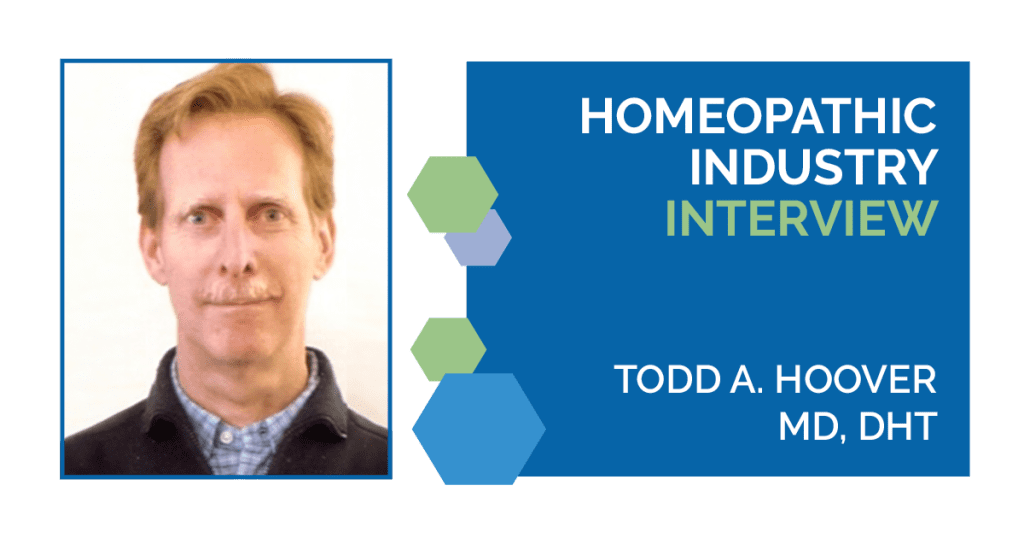Industry Leader Spotlight: Todd A. Hoover, MD, DHt

AAHP sat down with industry luminary Todd Hoover, MD, DHT, whose more than 30 years of integrative practice of homeopathic medicine, emergency medicine, family medicine, and occupational medicine provides a broad perspective on important steps that could make differences to homeopathic manufacturers. He has authored five books on yoga and ayurveda, and many articles in both homeopathic and allopathic journals.
Dr. Hoover has served as president of the American Institute of Homeopathy, president of the Council on Homeopathic Education, U.S. representative to the LMHI, and is currently serving as secretary for the Homeopathic Pharmacopeia Convention of the United States. He was also a clinical preceptor for Hahnemann Medical College for more than 20 years and has lectured on numerous homeopathic topics both in the U.S. and around the world. His research areas include provings, clinical studies of homeopathic medicine, and applicability of homeopathic principles in allopathic medicine.
AAHP: How did you become interested in homeopathic medicine?
TH: During medical school, I was completely committed to the allopathic approach and certainly would have objected to the notion of giving such highly diluted substances in vain hope of treating patients with real problems. My receptivity of alternative approaches increased during my internship thanks to someone I dated.
After discovering another “energy” in the body through practicing Tai Chi, I began to deeply embrace yoga. Eventually I committed to explore this new terrain of prana as a primary purpose in life after experiencing powerful life energy outside the realm of knowledge presented to me in medical school.
By the end of my residency, I explored therapies focused on this “energy” of the body rather than those focused on mechanics. Acupuncture seemed complicated. Ayurveda seemed unlikely to be accepted by American patients. Homeopathy, by contrast, offered ease of use to patients. But would it work? “Yes” was the reasoned answer after seeing results. My next challenge was to become a better prescriber of this powerful therapy.
AAHP: What have you learned about homeopathy from conducting provings for companies?
TH: “Provings” are one of the most compelling aspects of homeopathic medicine. This drug discovery tool is so precise in how it opens up the nature of a healing substance. The 19th century homeopaths were innovators. They were the first scientists to widely embrace experimental blinding, placebo controls, and even testing of medicines before their clinical use — which are all critical aspects of modern randomized controlled trials (RCTs). Today, however, few realize provings were based upon such rigorous scientific practice. Experimental rigor, lacking in many provings of the 20th century, is becoming standardized through efforts of organizations like the HPCUS, ECH, and LMHI. One must control the experiment with blinding and placebos.
To conduct solid provings, you need to train clinicians so that they observe and record in a consistent manner. It helps to use provers who clearly understand how to report symptoms; this will limit under or over reporting of what occurs. Finally, a critical aspect to provings is the final analysis of the data. An experienced homeopathic prescriber is essential to this step. Problems for prescribers are caused when speculation about what happened is recorded rather than a precise observation of what occurred. This mistake pollutes an otherwise good proving.
AAHP: What tips do you have for companies to conduct provings?
TH: Per my previous answer, I recommend that companies that want to conduct provings enlist the help of an experienced supervisor who has previously conducted sound provings. In addition, having access to a team of similarly trained and qualified clinicians to observe provers and record findings is essential. This is most often found through a team that has worked together for some time or has been trained together at a very good school.
AAHP: How do you think marketers can do a better job of introducing homeopathy beyond natural product shoppers?
TH: As a doctor, I have found that a simple explanation of the contrast between allopathic and homeopathic resonates strongly with my patients — the powerful and unique nature of homeopathy working with the body to heal. Natural products like nutrients only help if there is a relative deficiency in the body. Similar to allopathic drugs, herbal supplements often suppress the body’s own adaptive response. Only homeopathy works by stimulating the body to throw off the stress by using the body’s own healing mechanisms. Patients rarely understand the mechanisms of action for any therapy, but they do respond to the notion of working with the adaptive mechanisms of the body rather than against them. With today’s communication platforms of websites, blogs, and social media, marketers should consider more education in this area.
AAHP: As a physician and prescriber of homeopathic products, what issues or factors (e.g., product development, regulatory compliance, labeling) do you wish manufacturers and marketers would focus upon?
TH: Consider designing homeopathic products to target specific subpopulations rather than blanket disease indications. For example, a product might better target wet, productive cough or dry cough that comes at bedtime, rather than for cough and cold in general. This might help distinguish homeopathic products over their allopathic competitors.
AAHP: From your decades working within the homeopathic realm, what important observations do you have for homeopathic manufacturers and marketers?
TH: I have become an observer and knower of the energy of the body: the prana, the chi, or the vital force. I do not expect that my patients will believe in such things without their own direct experience. But they can understand how a medicine might stimulate or push the body to have a stronger healing response to a stressful disease agent. That is homeopathy. And that is why homeopathy is different than anything else.
